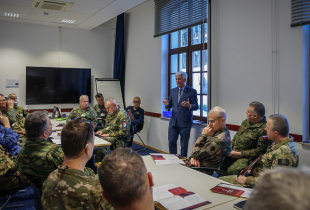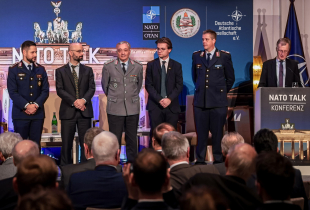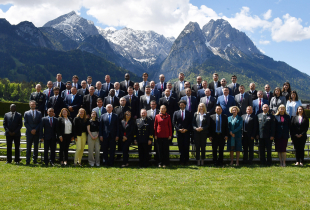
Language Training Seminar Aims to Improve NATO English Proficiency
By Christine June
Public Affairs Office
George C. Marshall European Center for Security Studies
GARMISCH-PARTENKIRCHEN, Germany (March 21, 2016) - Participants from 11 NATO and partner nations completed a three-week Advanced Language Testing Seminar at the George C. Marshall European Center for Security Studies’ Partner Language Training Center Europe that will improve understanding between English speaking partners in the NATO alliance.
The ALTS is a post-graduate level program where language testers from NATO and partner nations enhance their abilities to write, validate and administer English language proficiency tests in their National testing programs.
English is the primary language of the NATO alliance and each job assignment is given a level of proficiency called a standard language profile, or SLP. This seminar helped to ensure that SLP test scores from one country are the same as test scores from another country.
“These English language tests are a high-stakes examination, because important decisions are made based on the scores from the tests,” said Merit Kompus who develops and administers tests in Estonia. “The standardization and norming of testers across partner nations is of great importance. Knowledge we have gained at ALTS will help to enhance the quality of our tests and, thus, the decisions that are based on our test results.”
The Standardization Agreement among NATO partners for English language proficiency testing is STANAG 6001. This document outlines the alliance standards for reading, writing, listening and speaking English. These skills are graded on a scale from zero to five where five is the highest level of English proficiency. NATO and partner nations use this scale to develop their own national English language proficiency tests. Despite a written standard in the alliance, testing to higher levels of proficiency requires periodic standardizing and comparing test results across partner nations.
“Discussing and justifying ratings of writing and speaking samples and comparing official test results and test items was challenging, but very useful for norming. Getting the whole picture about STANAG 6001 testing is something I can definitely use in my work when I return home to the Czech Republic,” said Jan Křivka, who has been administering English language tests in his nation for 10 years.
The curriculum for ALTS was developed in 2010 by a multi-national team of Subject Matter Experts from the Bureau of International Language Coordination. During the three week seminar that ran Feb. 29 - March 18, participants were taught to use statistics and statistical software to validate language tests and share best practices. They also shared their own respective concerns, challenges, and trends in test taking and managing a national testing system.
Seminar instructors included directors of National STANAG 6001 testing teams from Romania, Estonia, and Slovenia; the former Chief of Testing from the Defense Language Institute’s English Language Center; a Yale University testing and assessment specialist and the Head of Strategic Language Testing at the Defense Language Institute Foreign Language Center.
Participants in the seminar came from Azerbaijan, Bulgaria, France, Georgia, Macedonia, Poland, Slovakia, Slovenia and the United States.
The George C. Marshall European Center’s PLTCE is a NATO Partner Training and Education Centre. The center offers advanced and specialized classroom instruction in Arabic, English, French, Persian-Farsi, and Russian to more than 400 US military and NATO or partner attendees each year. Faculty professional development courses in language testing and classroom instruction such as ALTS is part of PLTCE’s overall mission.
(Roxanne Harrison from PLTCE contributed to this article)


